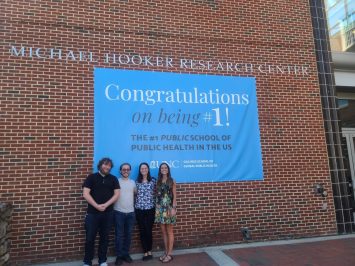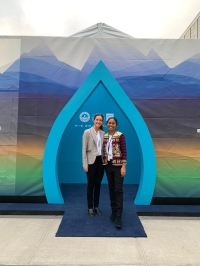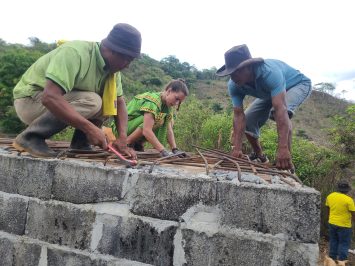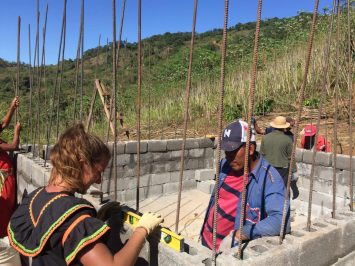
Hanna Brosky works with Galapagos communities to detect and prevent water-borne diseases.

What’s your role in public health?
I am an environmental engineering researcher that works to identify and control disease for public health.
I’m currently a doctoral student in the Department of Environmental Sciences and Engineering at Gillings and at the UNC Center for Galapagos Studies. I work in Dr. Jill Stewart’s lab, which has years alongside the center supporting students from USFQ (Universidad San Francisco de Quito) – Quito, Ecuador and UNC Chapel Hill. It’s a beautiful, collaborative process.

Brosky and members of the Stewart lab.
Outside of Gillings, I’m also a wastewater-based epidemiologist, working with the University of Arizona Yuma Center of Excellence for Desert Agriculture to do wastewater surveillance for communities in the area.
In all the work I do, I think it’s about analyzing data – breaking it down for communities to better understand – and hopefully using that knowledge to change health outcomes in their lives.

Can you describe your focus area in one sentence?
I focus on multi-level stakeholder engagement to evaluate water quality, improve water systems and reduce waterborne diseases.
I emphasize the multi-level part because water is innately at the household, municipality and state level. Even nationally and globally, we’re talking about water goals. My work in Galapagos involves collaborating with utilities, but when I’m sampling, I’m also working with people in the neighborhoods. I think sometimes, if you’re not working multi-level in water, you can miss opportunities to better identify health risks.

Brosky at the UN Water Conference.
More specifically, I am looking at gastrointestinal and urinary tract infections (UTIs) as outcomes from poor water quality. UTIs are not something that experts usually associate with water quality, but what we saw previously in Galápagos is that many people had a reduction in UTI cases following the construction of an improved water source. It’s exciting to be almost at the forefront of this research: possibly identifying a new waterborne transmission pathway – one that has so much impact globally.
Globally, the treatment of UTIs contribute to the overuse of antibiotics and so, as a public health professional, it’s exciting to be working on things like antimicrobial resistance (AMR) in water quality. These are two things I didn’t expect to be related, but they are both some of the most important topics in public health today.

What brought you to public health?
I was trained as an engineer at Lehigh University. In my undergraduate studies, I went to Kenya and worked with Sanergy doing sanitation work. After I finished my undergrad, I lived in Panama for two years and worked as a Water Sanitation and Hygiene Engineer with the Peace Corps. In both experiences, I was struck by how public health intersected with many of these projects. It made me question why I didn’t receive any public health training while doing my engineering degree. And it made me want to pursue a career in that area.
I felt passionate about being in a space where I could work with engineered systems but ultimately discover how they can be better designed with human health in mind. And so, going into public health was, in part, due to my frustration with engineering.
But I also wanted to find a space in the academic areas of engineering and public health where we were allowing communities to drive these projects. Because the beauty of public health is that community is at the center. I felt there was this distant lack of human involvement in engineering, which was confusing to me. So, I dug into public health and jumped right in.
When you talk about public health interventions, the first thing you typically do is a needs assessment with your community – and that’s such a critical part of design thinking in engineering, too. The two go hand-in-hand. And so, I think I belong in public health because I love to build, and I love to create and I feel like interventions and projects are a perfect combination of those things.

Can you describe a time when you have pivoted in your public health career?
The 2020 pandemic was pivotal time for me. It might have been the start of my public health career. I had, at the time, been living in Panama as part of my job with the Peace Corps, and one night I received a call at 11 p.m. that I needed to be out of my community by 5 a.m. the next day. That was a drastic upheaval that forced me to leave my home, my community and the project I was working on.
It was challenging, because I didn’t know what to do next or how to cope with leaving everything behind during a pandemic. The loss forced me to think about the things I missed most about my job. I felt a desire to learn more about the inequities that existed in water and health. I started researching Master of Public Health (MPH) degrees and fortunately I found the MPH at Tulane University, who had a strong partnership with Peace Corps and a robust degree program.

Brosky working on a roof.
The pain and the challenges that came from the COVID-19 pandemic also catalyzed my efforts in my education, which I’m grateful for. It’s always a good reminder that things can progress in a way that you could never have imagined. All these things together empowered me to keep going.
Maybe that’s why I’m so passionate about learning and providing people with knowledge now – because I saw the direct impact that gaining knowledge had on me and my life.

Who are you when you’re at home?
I’m wearing a shirt that says “Adventure” right now, and I feel like that encapsulates a lot of who I am. I love to be adventurous, whether that’s experimenting in the kitchen and cooking, or running outside, training for a marathon or just trotting to get my head clear of PhD nonsense.
I also love reading. We have a book club here among my PhD friends, and we’re currently reading The Spirit Catches You and You Fall Down by Anne Fadiman. Reading something that is not related to your research topic is really healthy, in my opinion.
I love plants, and spending time with my partner and my family, especially my niece and nephew. They fill my cup and keep me grounded.
Honestly, I’m the same person at home that I am in the lab and in my studies. I’m a really passionate lover of life, and I try to take that with me not only in water work but in all aspects of life.

Brosky working on a construction tank.
Read more interviews in The Pivot series.
Published: November 2, 2023
